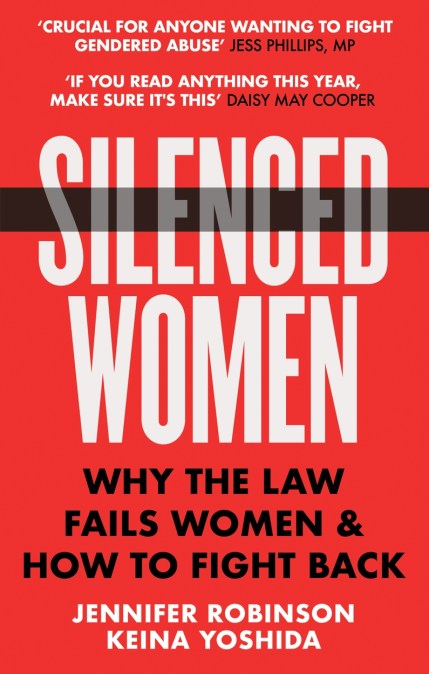SHORTLISTED FOR THE CWA’s ALCS Gold Dagger for Non-Fiction Award
WITH A BRAND-NEW AFTERWORD FOR 2024 COVERING RUSSELL BRAND, LUIS RUBIALES AND OTHER CASE STUDIES FROM AROUND THE WORLD
‘A stunning book; as vital as it is compelling… a must-read for women and allies alike’ -Harriet Johnson, author of Enough: The Violence Against Women and How to End It
‘Crucial reading for any person wanting to fight gendered abuse’ -Jess Phillips
‘If you read anything this year, make sure it’s this’ -Daisy May Cooper
In 2017, allegations against Harvey Weinstein prompted a worldwide sharing of sexual harassment and abuse stories on social media. Just as #MeToo began to empower survivors to speak out about their abuse, perpetrators and their lawyers got to work trying to silence them.
In Silenced Women, leading human rights barristers Jennifer Robinson and Dr Keina Yoshida expose the ways that the establishment has mobilised against change and sought to reinforce a system that keeps women voiceless. From the difference between the Amber Heard cases in the UK and the US, to the story of how Zelda Perkins became the first person to break her NDA against Weinstein, they draw on their own and others’ cases to explain how the law is being used to curtail women’s free speech – and what we can do to fight back.
WITH A BRAND-NEW AFTERWORD FOR 2024 COVERING RUSSELL BRAND, LUIS RUBIALES AND OTHER CASE STUDIES FROM AROUND THE WORLD
‘A stunning book; as vital as it is compelling… a must-read for women and allies alike’ -Harriet Johnson, author of Enough: The Violence Against Women and How to End It
‘Crucial reading for any person wanting to fight gendered abuse’ -Jess Phillips
‘If you read anything this year, make sure it’s this’ -Daisy May Cooper
In 2017, allegations against Harvey Weinstein prompted a worldwide sharing of sexual harassment and abuse stories on social media. Just as #MeToo began to empower survivors to speak out about their abuse, perpetrators and their lawyers got to work trying to silence them.
In Silenced Women, leading human rights barristers Jennifer Robinson and Dr Keina Yoshida expose the ways that the establishment has mobilised against change and sought to reinforce a system that keeps women voiceless. From the difference between the Amber Heard cases in the UK and the US, to the story of how Zelda Perkins became the first person to break her NDA against Weinstein, they draw on their own and others’ cases to explain how the law is being used to curtail women’s free speech – and what we can do to fight back.
Newsletter Signup
By clicking ‘Sign Up,’ I acknowledge that I have read and agree to Hachette Book Group’s Privacy Policy and Terms of Use
Reviews
'A stunning book; as vital as it is compelling. A powerful warning about how the justice system can be used to silence women, and why urgent change is needed: a must-read for women and allies alike.'
'This important book demonstrates how man-made laws and legal procedures bear down harshly and unfairly on women who try to exercise their free speech rights to complain about domestic violence and abuse. At a time when reform of defective laws of defamation and confidentiality is being considered in many English-speaking countries, the injustices eloquently described by these authors deserve special attention. Theirs is a book that should be read - with shame - by judges and politicians and with appreciation by news editors, journalists, and all concerned to enhance freedom of speech.'
'In forensic detail with real cases, Robinson and Yoshida show how far the law is trailing behind the zeitgeist of MeToo. The sheer scale of the problem is shocking - if you are a woman who likes to express your views, you need to read this book. If anyone can change things, in court or through the pages of this powerful book, it is these two fearless feminist lawyers.'
'Witty, gritty, insightful and true, this book is essential reading for all women. Robinson and Yoshida lay down the law, on law, in an accessible way, giving us the ammunition we need, not just to protect ourselves, but to go out there and win.'
'The nature of law is that it is made and secured by those who have power, which is why women are are still battering at its doors. This book is another brick through the windows of our legal systems: a brilliant, trenchant analysis of what is wrong with the law.'
'The authors show how a siloed approach to law, together with long outdated but persistent myths about women (particularly in relation to sexual violence and gender-based violence) perpetuates injustice in practice. Using case studies from across the globe, many involving their clients, the authors seek to break this silence, give women back their voice and show how change can and is happening. A fine example of feminist legal scholarship. It should be made essential reading for law students, trainee advocates and judges.'
'The oppression of women is a many-headed beast - commonly, as we defeat some, others emerge. How Many More Women? lifts the lid on the way the law is weaponised to silence women from speaking out about the violence and abuse they suffer. It is crucial reading for any person wanting to fight against all forms of gendered abuse.'
'The cases that come to court hold up a mirror that reflects what is going on in our societies. Two brilliant lawyers, experts in their field use these compelling cases to show us that despite all the campaigns and rhetoric this is still a world made by men for men. I hope this books encourages all who want a society where women have equal respect and equal power to accelerate our efforts to ensure that the next generation are not still writing brilliant but shaming books like this one.'
'This is an urgent and important book. Women's rights can only be secured and defended if women are able to speak their truth without fear of harassment and intimidation. How Many More Women highlights how the law itself censors women and why we urgently need radical change of these systems and in those who oversee them.'
A clear-eyes and damning indictment of a criminal justice system that has armoured the reputations of the rich and powerful while leaving victims vulnerable and exposed.
Interpersonal violence will not end until we are free to speak about it openly and honestly. And yet the sobering reality, powerfully exposed by Jennifer Robinson and Keina Yoshida in How Many More Women, is that victims have been repeatedly silenced. In engaging and accessible prose, Robinson and Yoshida reclaim free speech as a fundamental human right for victims of gender-based violence and as essential for creating a truly free and civil society.
If you read anything this year, make sure it's this.

